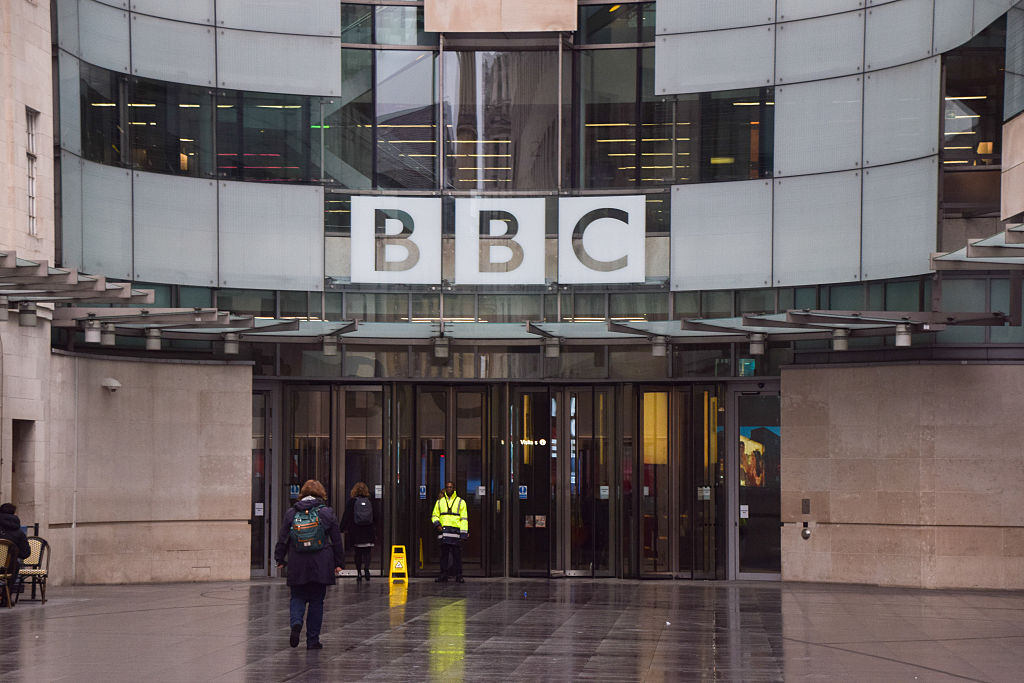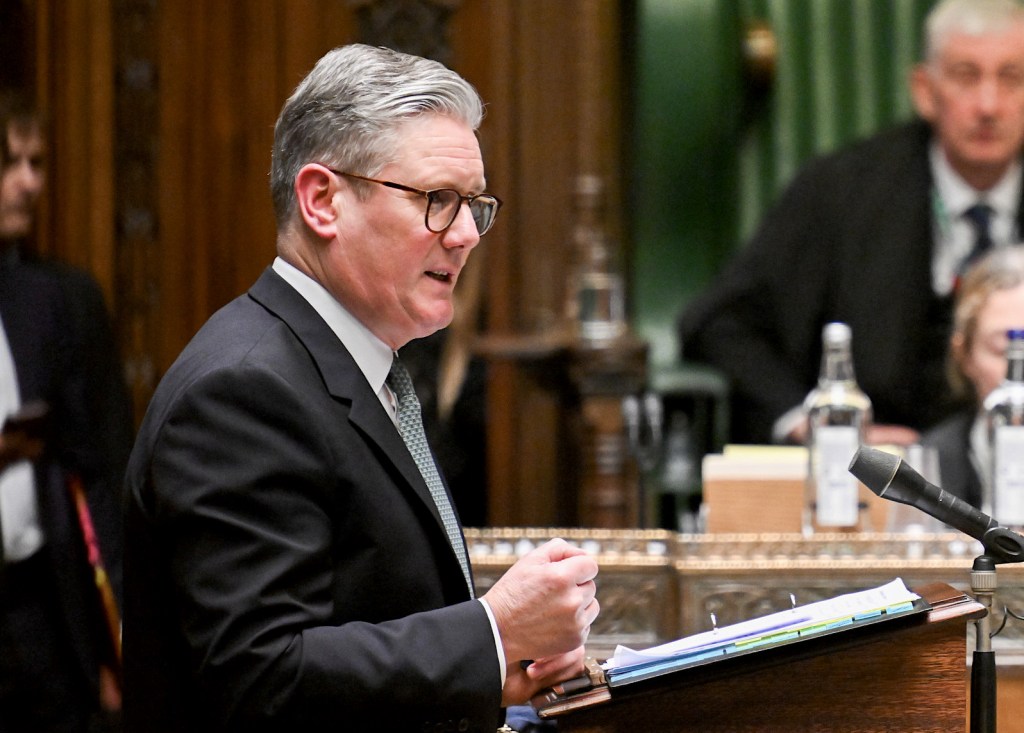As I watched Tim Davie and Samir Shah’s all-staff call on Tuesday, I became increasingly bemused and frustrated. It was impossible to tell from watching that the BBC is facing one of the greatest crises in its history. The fact that the call was hosted by an in-house spin doctor set the tone for softball questions and unchallenged responses.
Despite quitting in disgrace over the impartiality row, Davie seemed remarkably buoyant, babbling a word-salad eulogy to the corporation he has steered to the very edge of a precipice. It was insufferable.
It’s something of a bitter irony that many of my colleagues are at their balanced best when reporting on the BBC’s failings
Davie seemed to show no contrition, and made no direct apology to staff – only an admission that ‘some mistakes’ had been made. ‘We are the very best of what I think we should be as a society. And that, that will never change,’ he said.
I call bull on this. I’m not the only licence fee payer who genuinely believes the BBC has harmed society in recent years by propagating one-sided narratives on serious issues. I fervently hope the wholesale changes required to undo the damage are only just beginning.
The other thing that struck me during the call was that both Davie and Shah referenced the success of The Celebrity Traitors when listing the BBC’s greatest hits, as if this triumph were somehow relevant to the current catastrophe. It struck a chord with me, however.
When I entered the busy and unusually febrile atmosphere of the newsroom at Broadcasting House on Monday, I felt a bit like Alan Carr, the treacherous winner of the show. Two days earlier, I’d written a piece for this publication demanding change at the top of the BBC, singling out Davie and head of news Deborah Turness for criticism.
Fast forward 48 hours and they were both history – resignations tendered and desks soon to be cleared. Although my role in their downfall was infinitesimal, I still felt strangely exposed. Like Carr, I was sweating and hoping humour would mask my unease.
When I had read the headline on my BBC News app the previous evening announcing their departures, I must admit I was staggered. Finally, some consequences, some accountability, some karma.
But I was painfully aware, as I made my way to my desk, that many of my colleagues would not see things the same way. One intercepted me, pulling me aside and confiding their belief that it was all a witch-hunt. I listened uncomfortably, feeling a bit like one of the prisoners wrongly released by the government, expecting at any moment for someone to shout, ‘He’s here! He’s here! Grab him!’
I managed to prise myself free and made it to my workstation. As I logged into the BBC network, I reflected on the deeply unfair aspect of feeling like a traitor when I’m ‘100 per cent faithful’ (as contestants on the show say with irritating frequency). Not to my bosses, not even to my co-workers, but faithful to the concept of due impartiality – something Davie and Turness seemed to have lost sight of. After all, due impartiality underpins the justification for the licence fee. Without a guarantee of balanced coverage, the BBC as we know it is finished.
Even on this day of all days – the morning after the resignations the night before – the cock-ups continued. Turness’s statement to the press pack as she made her way into Broadcasting House was somehow broadcast on Sky News minutes before the BBC News Channel managed to air her words.
The curses of frustration and sighs of dejection at this gaffe gave way shortly afterwards to an eruption of noise from the floor above the main newsroom. Rather than being met with a chorus of boos for overseeing a series of calamitous editorial lapses, Turness was being applauded with North Korean–style sycophancy inside the newsroom.
That aberration aside, the rest of Monday gave me cause for hope. Not for the first time, I was impressed by the way everyone around me was knuckling down and covering this deeply embarrassing story with calm professionalism. It’s something of a bitter irony that many of my colleagues are at their balanced best when reporting on the BBC’s failings.
Yet it was telling that some sought quickly to deflect the blame away from their employer. You might have seen the 90-second film, narrated by Clive Myrie and played ad nauseam on BBC outlets, that highlights the corporation’s mission to fight disinformation and the dangers of ‘unleashed conspiracies’. Despite this warning, an outlandish conspiracy was unleashed on Radio 4’s Today programme when the former editor of the Sun, David Yelland, claimed Davie’s departure was a ‘victory for populists, for a cabal of toxic plotters with links to the BBC board – who designed and executed a coup.’
And no less a vaunted BBC veteran than the World Affairs Editor, John Simpson, was peddling conspiracies too. ‘The BBC is facing a coordinated, politically motivated attack,’ he wrote on X on Sunday evening, linking to an article in the Guardian, naturally.
This attitude of denial and deflection illustrates the mentality Gareth Roberts pinpointed so perceptively in his recent take on the impartiality row: that the minds of too many BBC staffers ‘simply do not register as valid anything that does not tally with the progressive suite of opinions’, and as a result, ‘they really do believe they are impartial and above politics… and thus any criticism is malicious.’
So, can the BBC’s impartiality be restored? I certainly hope so – but the corporation will require root-and-branch radical reform.
First, more heads must roll. Davie and Turness are not the only gatekeepers who have given trans zealots, Hamas sympathisers and Trump haters free rein to propagate their views. How can Turness’s deputy, Jonathan Munro, remain in post given that according to the Prescott memo, he defended the unethical editing of footage of the US President? And what about director of news Richard Burgess? What has he been doing while the BBC has been depicting male murderers and rapists as women?
The truth is, the BBC needs a Donald Trump of its own – a leader who does not pussyfoot around or get hobbled by bureaucracy and convention, and who forces change to ‘Make the BBC Great Again’. If it were up to me, I would compel all BBC journalists to reapply for their jobs, with a key component being testing to root out all the hacks who can’t separate their political opinions from cold, hard facts.
In many cases, this wouldn’t even be required. I know of BBC journalists who have social media profiles that proudly display their far-left prejudices. They need to go and find new careers – I hear the Green party’s ‘Boob Whisperer’ Zack Polanski is looking for new recruits.
I’d also abandon the BBC’s obsession with youth, diversity and representation – in output and recruitment. The Corporation must prioritise hiring journalists who are competent, rational and sceptical, even if – heaven forbid – they happen to be cursed with the unfashionable attributes of being white, straight, male or over 30. What is more important: box-ticking or impartiality in the output? It’s a no-brainer.
Controversially, perhaps, I’d also jettison one of the BBC’s three core goals – to inform, educate and entertain. ‘Inform’ and ‘entertain’ can stay, but ‘educate’ must be scrubbed. Any organisation that has been trying to convince people that men can change sex by simply declaring they are women, and that there are scores of different genders, is not fit to be in a teaching role of any capacity.
Another improvement that could be made is to pare back the endless commentary, speculation and ‘analysis’ of news stories. This incessant and largely vacuous waffle gives reporters and correspondents an opportunity to make serious mistakes or stray into one-sided spin.
Finally, the BBC needs to be shaped by the people who fund it – particularly the forgotten white working-class communities outside the M25. I’d reform the Editorial Guidelines and Standards Committee and force it to hold regular meetings in front of members of the public. Perhaps these gatherings could be televised – like Question Time, but solely about the BBC’s coverage. The audiences would have to be selected by an independent body, naturally or, like the real Question Time, they’d end up stuffed with Guardian readers, Free Palestine loons and unusually tall ‘women’ with ill-fitting wigs and enormous hands.
Although I’m glad to see the back of Davie, I agree with him that the BBC produces some outstanding content, including The Traitors. The Director-General is on his way out but only more banishments from the BBC castle can secure its future.







Comments